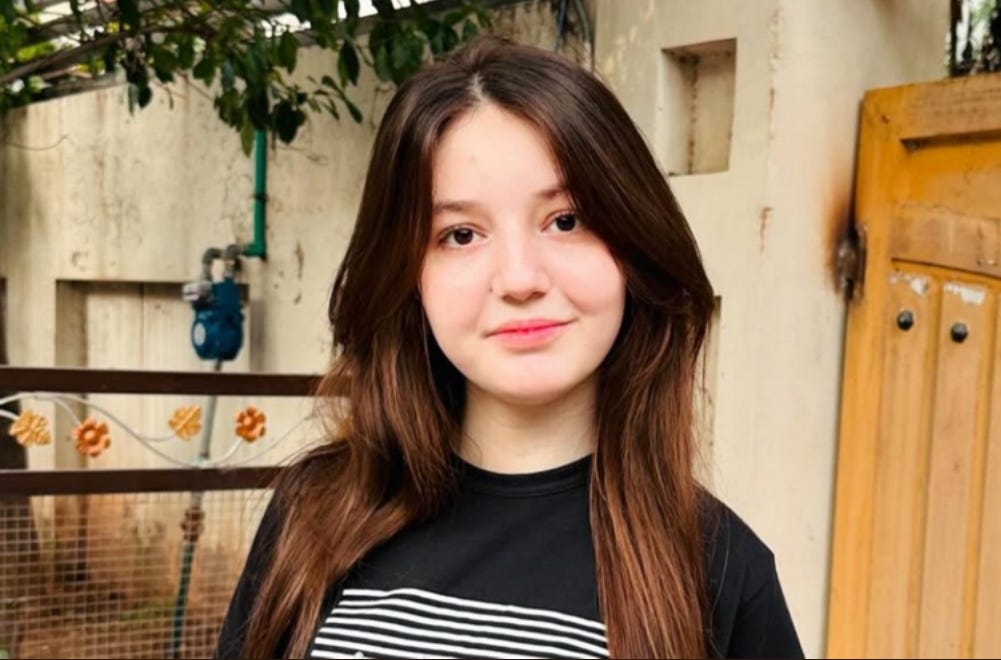When a Girl Says No in Pakistan
It keeps happening. A girl says no. And then she dies.
This time, it was Sana Yousaf.
Seventeen years old. A TikToker. A daughter. A child, really.
Shot twice in the chest inside her own home in Islamabad.
The man who killed her had traveled hundreds of miles with a birthday wish and a gun. When she wouldn’t come out to meet him, he forced his way inside. An argument. A refusal. A bruised ego. And then, a bullet. Two.
Her mother wasn’t home. Her father wasn’t home. Only an aunt — witness to the sound of a young life ending.
Sana was buried the next day in Chitral, where she was from. But she died in the capital — not some forgotten village, not some unpoliced border town. She died where power lives. Where the law lives. Where everyone tweets “Never again” until it happens again.
And it will.
Because this wasn’t a one-off. It wasn’t unpredictable. It wasn’t even especially shocking — just a new entry in an old story.
A girl finds her voice. Builds a following. Posts videos of joy and confidence and autonomy. A boy watches. Obsessively. Maybe he knows her. Maybe he doesn’t. That part doesn’t seem to matter.
She refuses him. Or ignores him. Or blocks him.
He kills her.
We’ve heard this one before.
Noor. Qandeel. Hira. Sania.
Different cities. Same ending.
Every few months, another woman is punished for being seen.
For choosing visibility over silence. For saying “no” instead of “thank you.” For existing online without asking for permission.
Pakistan is not unique in this violence. But it is especially practiced at hiding it. The methods are familiar. Drown the story in moral panic. Blame Western culture. Invoke religion. Reframe the crime as an issue of family, of ghairat, of parental failure, of a girl who was asking for it.
What makes Sana’s murder unbearable isn’t just that it happened. It’s that everyone already knows what will happen next.
A police statement. A few arrests. A parade of hashtags. A few public figures expressing disgust.
Then silence.
No national reckoning. No structural reform. No soul-searching by platforms, politicians, or patriarchs.
Just a quiet return to business as usual. Until the next girl bleeds.
What makes all this worse — if such a thing is even possible — is that this is happening while women are being told to dream bigger. To lean in. To build their brand.
Young women like Sana are told they can take up space. That this is a new Pakistan. A modern, connected one. A country where girls can be influencers, creators, role models.
But here’s the fine print: You can be seen. You just can’t say no.
Because once you say no — to a boy, a marriage, a job, a stranger, an admirer — your visibility becomes a threat. Your face becomes a target.
And the worst part? Everyone knows it. Parents know it. Friends know it. Even the women themselves know it. Every like, every post, every DM comes with a cost-benefit analysis of danger.
This is not freedom. It’s a hostage negotiation.
You are free to be visible — but not too visible.
Free to say no — but not to the wrong man.
Free to make choices — until those choices become punishable.
In the wake of Sana’s murder, a line from the feminist collective Aurat March stood out:
“Patriarchy feels most threatened when women & gender minorities claim voice and visibility in public by challenging the stand pat norms.”
But this isn’t just about challenging norms. This is about basic decency. About survival. About a teenager being murdered for not returning a man’s affection.
This is about a society where the word “no” from a woman — especially a young, visible, confident woman — is treated not as a boundary but a provocation.
And this is where moral language is needed. Not legalese. Not digital safety toolkits. Not “let’s have a conversation.”
Call it what it is.
A war on women’s autonomy.
A country that calls itself Islamic, democratic, nuclear-powered — but cannot protect its daughters from being killed by men who believe they are owed affection.
This is not an issue of internet safety. Or fame. Or privacy.
This is about entitlement.
A boy is taught that his desire is sacred. That he is a lover, a majnu, a victim of heartbreak when a girl doesn’t reciprocate. He’s taught that persistence is romantic. That violence is masculine. That rejection is humiliation.
What he is not taught — ever — is how to accept “no.”
So the state must teach him.
With consequences. With laws that actually protect victims. With prosecution that doesn’t hinge on a father’s testimony. With a culture that punishes violence, not visibility.
Until then, every girl who picks up a phone to record a video is taking a risk she should never have to.
And every boy who can’t take no for an answer is just a headline waiting to happen.
We will mourn Sana. As we mourn Qandeel. As we mourn Noor. As we mourn every girl who was told she could be anything, only to be reminded that she was still a girl in a country where that remains a fatal condition.





